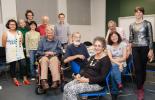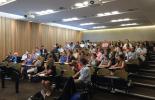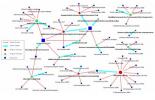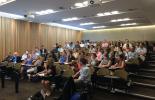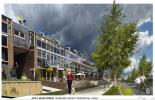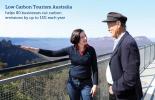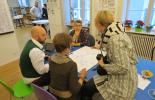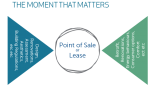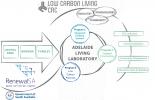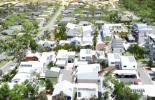A community’s carbon footprint is ultimately determined by the choices made by individual people, resident groups, industrialists and businesses. This program focused on understanding and influencing consumer behaviour and decision-making in order to reduce the carbon intensity of modern lifestyles.
The use of both qualitative and quantitative research ensured a full understanding of why communities behave the way they do and how they can transition them to low carbon ways of living. Policy scenario analysis quantified the effectiveness of alternative options, providing an evidence base for policy development by government partners.
New low carbon living strategies that mobilise cultural and social capitals to empower communities to make low carbon choices were demonstrated.
CRC research findings were fully road tested in “living laboratories” to ensure that results were robust, tangible and appealing to a broad range of communities. The results were used to develop community education and training resources, including those for mass media dissemination.
Programs Quicktabs
To support legislative carbon reduction initiatives and policies, the CRCLCL is working with all levels of government to explore the social, environmental and financial benefits of low carbon policy actions. Ensuring a high triple bottom line return for Australia will be a key factor for the government to implement policy change.
Detailed models of future energy use in the built environment will help test how take-up of alternative energy services might be affected by factors such as different policy scenarios and varying economic incentives. A particular concern will be to investigate how policy scenarios can be changed to make low carbon living more affordable, especially for low-income households.
We aspire to generate a wave of change towards low carbon living practices among the community, supported by local government planning approvals and incentives. To stimulate both dialogue and demand, CRCLCL research teams are developing collaborative engagement and consultation processes among the community, developers and local government.
We are working with local councils and community groups across Australia to examine attitudes to and preferences around alternative technology and lifestyle options. The establishment of new perspectives on the deeper psychological and cultural barriers to low carbon living in Australia will help form new low carbon living adoption strategies to drive broader community transformation.
Creating buzz around low carbon living will help generate demand and drive adoption. We’re establishing a number of living laboratories around Australia to help demonstrate the benefits of sustainable living and generate positive narratives for low carbon lifestyles.
These living laboratories are ‘learn by doing’ environments involving local councils, developers, residents and businesses that integrate, test and evaluate low carbon living solutions in-situ. Asking the question “what does a sustainable lifestyle look like?”, we are testing options and ideas for a range of localities featuring alternative climatic conditions, infrastructure provision, dwelling types, household types and socio-demographic profiles.
Low carbon living is important now, but it is vital for the future. It’s essential the CRCLCL leaves a legacy that will help drive the widespread adoption of sustainable living practices over the coming years. This is dependent on inspiring the next generation of researchers, built environment specialists and communities through education and training.
We have a strong commitment to creating and delivering a suite of education, training and professional development programs targeted at a range of community, trade and professional groups. In addition to the 80+ PhD and Masters students that will be directly involved with the CRC, we aspire to embed a low carbon research agenda in Australian universities by establishing five nodes of excellence.
This project follows case studies to encourage the mainstreaming of low cost, low carbon housing in Perth.
Better understanding is needed of why people feel the need to own a car and how they can be encouraged to transition from an exclusive ownership model to ones of temporary and/or multiple ownership and/or shared usership. This project investigates this issue with the goal of identifying pathways to lower carbon mobility.
This project will assess the trends in household energy and draw insights into energy usage patterns.
This project will develop software tools relating to commercial building energy efficient retrofits and government interventions.
This project will research opportunites for a hub to store and process data from CRCLCL projects.
This project defines and gives examples of deliberate democractic low carbon living initiatives.
This study defines Living Laboratories, their benefits and what they need to be successful.
This study identifies key areas for improving stakeholders' understanding of low carbon built environment issues.
This project will study what conditions help or hinder the expansion of community-scale renewable energy.
This project will explore and articulate visions, scenarios and pathways for a low carbon and resilient Australian built environment.
This project will translate the accessibility of high performance, zero emissions homes into mainstream development and construction industry practice.
Residential housing is a major contributor of greenhouse gas emissions, most during building operations.
This project worked with Blue Mountains tourism businesses to identify opportunities to reduce their emissions.
This multi-site living laboratory will research the barriers to and drivers of engaged communities for low carbon living.
The project aims to understand cultural and social mechanisms for transformation to low carbon living.
This project will trialing the efficacy of team-based and game-based mobile learning.
This project examines the factors that motivate the purchase and lease of low carbon homes.
The Adelaide Living Laboratory Hub seeks to engage stakeholders and provide pathways for low carbon living.
This project will examine stengths and weaknesses of collaborative urban planning processes for carbon reduction across Australia.
This project will examine components of a Low Carbon Schools Pilot Program being trialled in Perth.
This project will develop and assess communication strategies to drive adoption of low carbon renovation projects.
This project seeks to bring together a critical mass of knowledge developed within the CRC for Low Carbon Living (CRCLCL) to drive consumer demand for sustainable housing and stimulating existing industry behaviours to set the conditions for the adoption of sustainable solutions by the residential housing industry.
This project will analyse current policies and incentives for low carbon living education in Australia.
This project explores community-owned renewable energy projects to understand their social, economic and environmental impacts.
This project will provide knowledge and skills training to support action on low carbon living.
This project will model the uptake of low carbon technologies and practices under different market interventions.
This project proposes a national conversation on energy efficient housing across a range of social media platforms and television.
This project will identify benefits from information mechanisms like voluntary or more frequent disclosure.
This living laboratory project will follow the development process at White Gum Valley with a view to mainstreaming low carbon outcomes.
Intensification of development that is required in established and occupied inner and middle suburban greyfield areas (retrofit) is the great challenge for our fast growing Australian cities. The scale of urban regeneration required over the next 30 years has the potential to reduce carbon emissions, improve housing affordability and reduce urban sprawl.
This project aims to reduce urban water and wastewater impacts on energy usage.
This project looks to identify barriers different low income households face in reducing their carbon consumption.
This project aims to develop online ‘residential property marketing’ modules that can be incorporate into existing real estate, design and construction assessment, and scale public awareness through the CRC’s Lifestyle Narratives mass media dissemination projects.
This project addresses battery storage integration and governance at a district scale.
This project will assist community and public housing providers with regards to low carbon retrofits and refurbishments.
Knowledge Hub for the low carbon built environment
The aim of this project is to achieve greater impact for industry and academic thought leadership on best practice policy for emissions reduction in the built environment.


